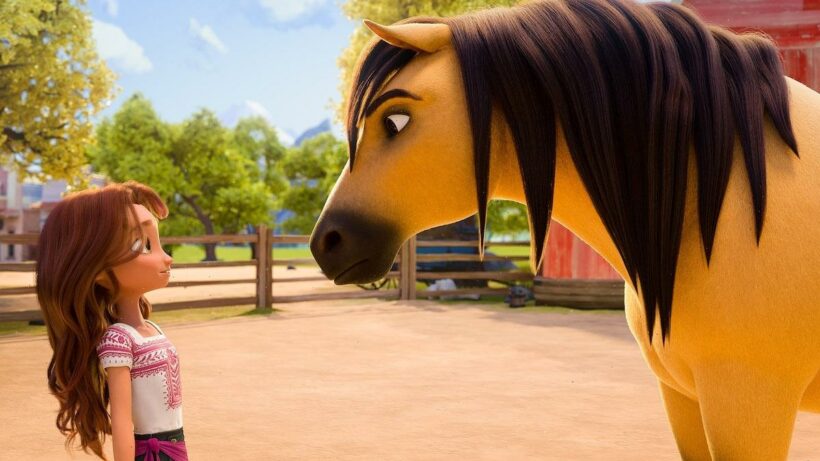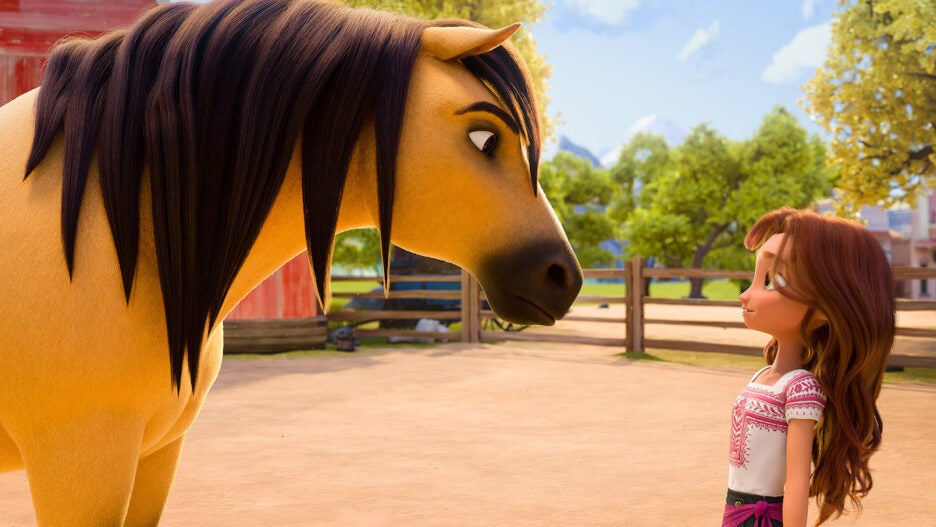This DreamWorks tale mishandles both the coming-of-age story and the specifics of Latino culture
Universal/DreamWorks Animation
When the best thing about a film is the music being used in the trailer (Taylor Swift’s “Wildest Dreams”), maybe you need to go back to the drawing board. Dreamworks Animation’s “Spirit Untamed” has vivid moments of beauty, but loses its gallop with a facetious storyline about identity as it keeps trying to define itself as an “empowering” film for little girls, missing the mark on both fronts
In the town of Miradero, Milagro Navarro (voiced by Eiza González, “I Care A Lot”), a fearless horse-riding stunt performer, wows crowds as her husband Jim (Jake Gyllenhaal) and daughter Fortuna, aka “Lucky” (Isabela Merced, “Dora and the Lost City of Gold”), look on in awe. A devastating accident leaves Jim heartbroken and Lucky motherless; the young girl is sent to live with her grandfather and Aunt Cora (Julianne Moore), where she spends the next decade attempting, and gleefully failing, to be a proper young lady.
After an incident that embarrasses her grandfather, Lucky returns with Aunt Cora to Miradero, where a scruffy Jim awaits, unaware that his baby girl is now a clever and headstrong 12-year-old who is not so quick to accept her dad back in her life. Lucky quickly befriends two other girls — Pru (Marsai Martin, “Little”) and Abigail (McKenna Grace, “Annabelle Comes Home”) — and begins to find herself more comfortable day by day as she connects with a wild stallion she has named “Spirit.”
Lucky isn’t the only one who has her eye on Spirit: As she starts to form a bond with the willful stallion, a gang of horse wranglers kidnap Spirit’s herd to auction them off to a life of captivity and hard labor. Together, Lucky and her friends set off on an adventure to save Spirit’s family.
The “Spirit” franchise began with 2002’s “Spirit: Stallion of the Cimarron,” where audiences fell in love with the gorgeous 2D animation style that the Netflix series that followed, “Spirit Riding Free,” casually moved away from. Director Elaine Bogan (a veteran of several Dreamworks series, making her feature debut), in attempting to provide some definition to the rambunctious girl-meets-wild-horse genre, makes some contradictory choices in both story and animation that fail to elevate either.
Production designer Paul Duncan (“Abominable”) excels when there are no humans or animals in the frame — the background is just stunning. The Monet-like use of vivid colors, lighting, and textures the design team has created could easily fit in a museum. However, when living, breathing characters enter the scene, there’s a technological whiplash between the beauty of the landscape and the circa-2012 Barbie-movie CGI used to animate the people and horses, removing the emotional undercurrent of this story about a young girl connecting to who she truly is.
That story falls short both in the writing and in the visuals. Screenwriters Aury Wallington (“Gravity Falls”) and Kristin Hahn (“Anthem”) have crafted a patchwork girl’s “empowerment” story of self-discovery while completely circumventing the very identity Lucky seeks. A perfunctory effort is made to highlight the fact that Lucky is half Latina, with frequent, unnecessary injections of Spanish (despite the fact that Lucky doesn’t speak a lick of it) to demonstrate her Latinidad, but nothing more. The writers ignore the fact that speaking Spanish does not in and of itself make anyone Latino — and among those of us who do speak Spanish, we don’t randomly utter words en español just because we can.
The slapdash attempt at Latinidad doesn’t end there. The setting is clearly defined as the Old West, where someone of Latin descent would more than likely be Mexican. Yet, the name “Las Caballeras” — Milagro’s team of performing horsewomen — has its historical roots in Spain. A more accurate name, if Fortuna is indeed Mexican, would be “Las Escaramuzas” or “Las Adelitas.” (The latter name previously referred to women on horseback who were used as decoys during the Mexican revolution but has since been given to female rodeo performers.) This part of the story makes it clear why we need more Latino writers to be part of any story that seeks to represent Latino culture.
“Spirit Untamed” tries to be everything, and because of that, it fails. It’s a film that’s a bit too juvenile for anyone over the age of 8, but trotting far too slowly to hold the attention of elementary-aged children, leaving parents with just another expensive nap at the movies.
“Spirit Untamed” opens in US theaters June 4.
https://youtube.com/watch?v=_5ysj1zfGVE%3Ffeature%3Doembed
Source: Read Full Article




